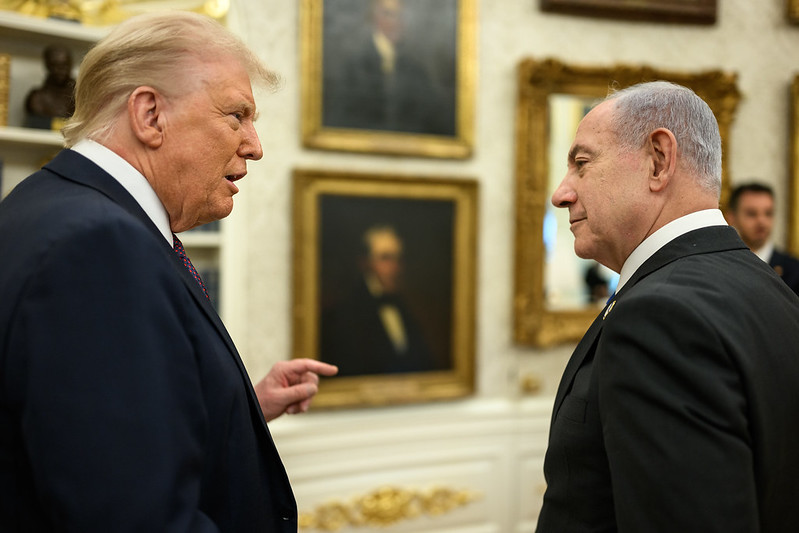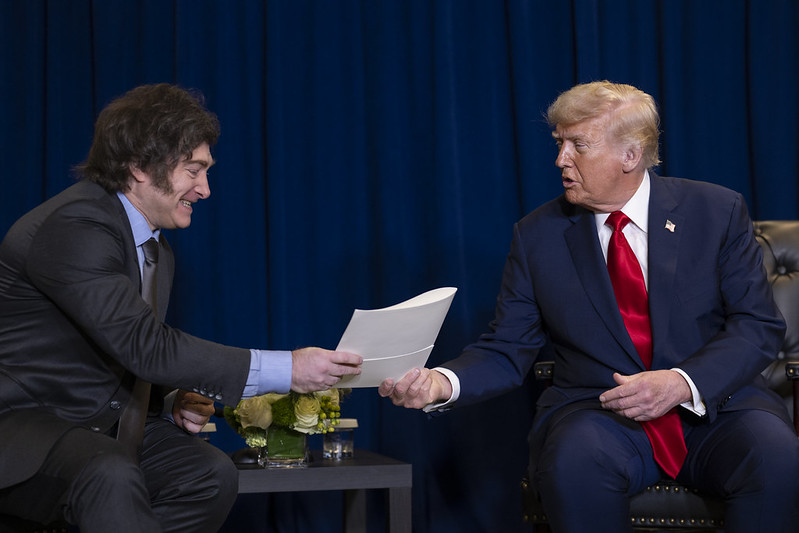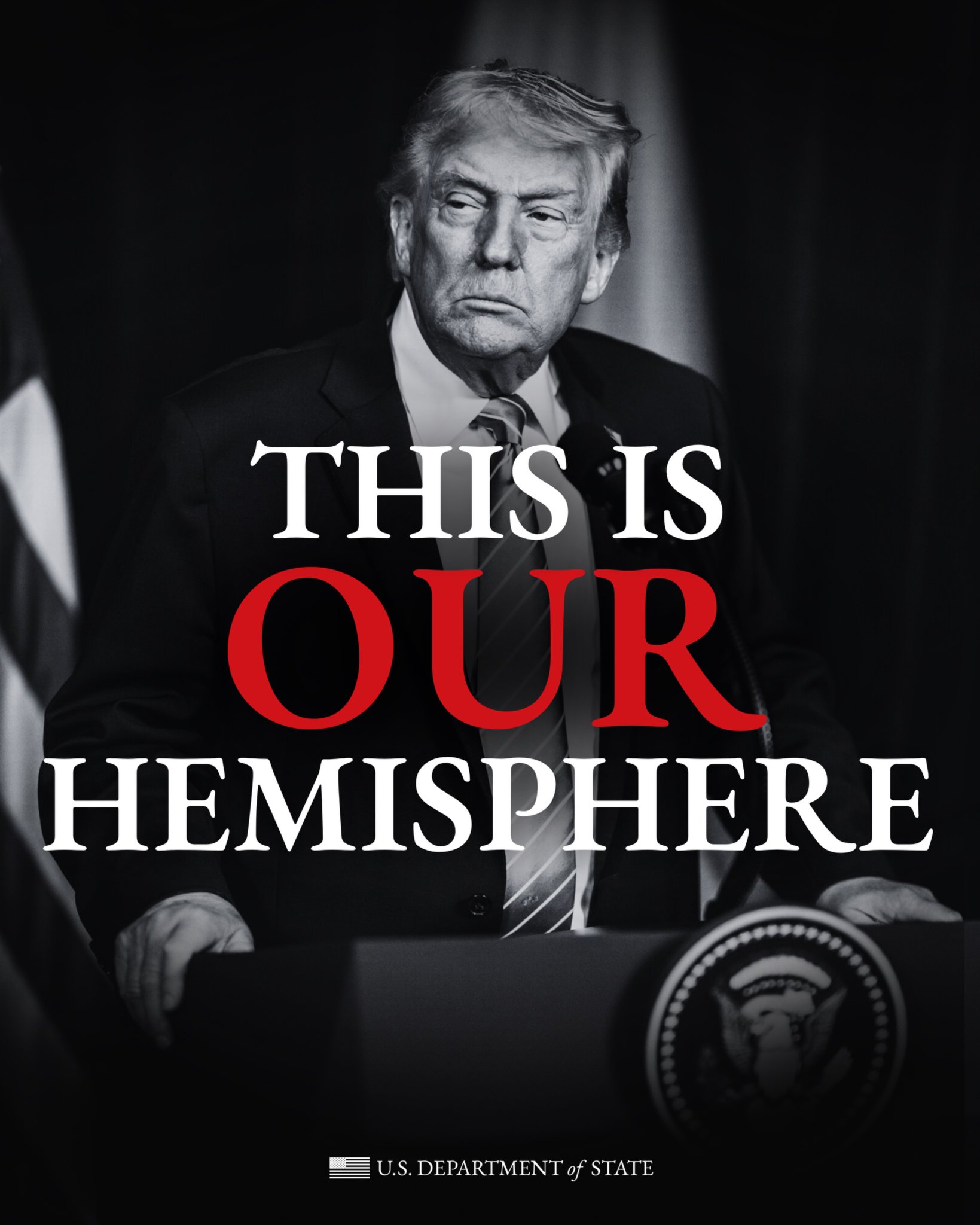The world in focus | Analysis column
President Donald Trump’s megalo-maniacal and warmongering spirit in foreign and domestic politics was on full display at two important events recently– his speech at the United Nations General Assembly and during his address at an unprecedented meeting with hundreds of senior military commanders, whom he urgently summoned to the Marine Corps base at Quantico, Virginia.
On our continent, Trump has stepped up his efforts to overthrow President Maduro in Venezuela and prop up governments aligned with the extreme right. He increased provocations in the Caribbean region, ordering the bombing of a fifth boat in international waters, allegedly killing its four occupants. His Secretary of War, Pete Hegseth, reported the attack, claiming the Venezuelan boat was carrying cocaine, without showing any evidence. In another reckless action, the day before the Venezuelan government detected five U.S. fighter jets off its coast. Venezuela Defense Minister Vladimir Padrino describe the maneuver as “vulgar, provocative, and a threat to the security of our nation”.
Further south, U.S. authorities decided to boost the political career of beleaguered Argentine president Javier Milei with an offer of $20 billion in support just weeks before midterm Congressional elections on October 26–a critical test for Milei. The offer of U.S. financial support came despite news of another major corruption case, this time involving a congressman and personal friend of Milei’s who is a candidate midterms. With Milei’s approval rate plummeting, Economy Minister Santiago Caputo made an emergency trip to Washington on Friday to meet with U.S. Treasury Secretary Scott Bessent to devise a loan that would salvage the government at least until after the election.
At the UN General Assembly
In his speech to the UN General Assembly, Trump claimed that in the eight months of his term he has converted the United States into the country with the strongest economy, borders, military, alliances and spirit of any nation on earth. He also said that he has built the largest economy in the history of the world and has the highest approval ratings in the polls. His claims were far from true.
He also said that he had stopped seven wars, most of them in his imagination. He told the audience that ‘many say I deserve the Nobel Peace Prize´, including his Israeli colleague. Just when we thought we had seen it all, Netanyahu handed him a document nominating him for the prize, as seen in this video.

After endorsing and supporting Netanyahu’s genocide in Gaza, including the killings of Hamas negotiators—the latest of which occurred after a targeted Israeli bombing of their headquarters in Doha, Qatar, in the midst of negotiations—Trump presented an agreement negotiated between the two leaders at a meeting of the United Nations General Assembly, without the presence of Palestinians.
On Friday, Hamas responded that it agreed to negotiate under this peace plan, which includes the release of Israeli hostages, but that there were points to be clarified. That same Friday, Trump gave Hamas a deadline of 6 p.m. on Sunday to accept his peace plan, otherwise “hell will break loose like never before” against the Islamist group.
At the unprecedented meeting of military commanders
On Sept. 30, Trump addressed a gathering of generals and admirals deployed around the world who he called back for an emergency meeting. He launched into a rambling address that included an announcement of the controversial deployment of military troops in several cities across the country, claiming that there had been an “internal invasion” by foreigners. His comments came after the announcement that troops would be deployed in Portland, Oregon, despite the state government’s legal appeal to prevent it. Trump spoke of “a war from within”, referring to crime rates in cities such as San Francisco, Chicago, New York, and Los Angeles, all of which have Democratic Party majorities. He blamed what he called “radical left-wing Democrats” for turning these cities into “very unsafe places,” despite the fact that crime rates have been declining for years in these cities.
Trump said that the “internal invasion” is no different from that of a foreign enemy, but is more difficult in many ways because the invaders do not wear uniforms. “At least when they wear uniforms, they can be eliminated.” He proposed using these cities as training grounds for the army and the National Guard and announced they will soon deploy to Chicago. Retired General Barry McCaffrey called the president’s presentation “one of the strangest and most disturbing events” he has ever experienced. Illinois Governor J.B. Pritzker called for invoking the 25th Amendment, which relates to presidential succession and clarifies that the vice president assumes the presidency if the president dies, resigns, or is removed by impeachment.
Sen. Jack Reed, the top Democrat on the Senate Armed Services Committee, issued a statement saying, “Even more troubling was Secretary Hegseth’s ultimatum to senior U.S. officers: conform to his political worldview or step aside”. He warned, “That demand is deeply dangerous. It signals that partisan loyalty matters more than competence, judgment, or service to the Constitution, thereby undermining the principle of a professional, nonpartisan military.”

Staunch Trump ally Argentina faces a dilemma
Argentina’s economic crisis and President Milei’s loss of political support seems to be making some U.S. authorities nervous as others wonder if it’s worth taking charge of a ship that seems to have lost its ability to float. Is the U.S. government even in a position to support Milei?
It does not appear so. The United States is experiencing a serious and growing debt crisis. The debt is growing so fast that the interest that must be allocated to servicing it it has reached levels that affect the government’s ability to finance public services such as education, health, and infrastructure. Interest on debt servicing has become the second largest item in the US budget, exceeding defense spending. This is generating growing mistrust among economic agents, particularly foreign governments, as many are choosing to divest themselves of US Treasury securities or are reluctant to buy them. To make them attractive, the U.S. government is offering higher interest rates, which increases the cost of debt financing.
Mistrust in the U.S. economy also stems from the loss of value of the dollar. During the first half of this year, it depreciated by 10.6% against a basket of currencies from the world’s six major economies. Such a drop, in year-on-year comparison, has not been recorded since 1973.
This loss of value of the dollar, together with the debt crisis and chronic fiscal deficit, which exceeds 6% of Gross Domestic Product (GDP), has led to a reduction in the share of the dollar (both in securities and foreign exchange) in the international reserves of central banks globally. This figure has fallen from 72% in 2002 to 58.2% of total foreign exchange reserves this year. The dollar is being replaced by other currencies and physical assets, particularly gold–strong demand for gold has pushed prices to historic levels. The three agencies that assess the credit risk of debt issuers such as governments, companies, and banks (Moody’s, Fitch, and Standard & Poor’s) have downgraded the rating of U.S. debt. Added to these factors is the loss of momentum in the U.S. economy, which has been unable to fully recover since the international financial and economic crisis in 2008.
The International Monetary Fund (IMF) has warned that high deficits and debt pose a growing risk to the U.S. and global economies, potentially fueling higher fiscal financing costs and increasing the risk of a smooth rollover of maturing obligations. The chairman of the US Federal Reserve, Jerome Powell, himself said in July last year that his country’s public finances are “unsustainable.”
The situation is exacerbated by the passage in July of President Trump’s budget bill, called the “One Big Beautiful Bill Act”. The bill will increase the public debt by $3.3 trillion over the next 10 years. Its approval was harshly criticized by Elon Musk, who served as director of the Department of Government Efficiency (DOGE). He not only called it too expensive, but also a “disgusting abomination” and stated it would “bankrupt the United States.”
Politically the situation is not much better. Trump is in no position to overreach abroad. According to a recent Gallup poll, his approval rating has fallen from 47% at the start of his term to 40% Sept. 15. The historic average for U.S. presidents at this point in their terms is 52%. The federal government has been partially shut down since October 1 after Republicans and Democrats failed to reach an agreement to pass Trump’s government spending bill. This is the first federal shutdown in nearly seven years and could temporarily paralyze some US government services. The president has even said that he might take advantage of the opportunity to make irreversible closures or make the temporary job cuts permanent.
It is unlikely that the U.S. Ambassador to Argentina, Peter Lamelas, officially appointed on Sept. 18, could have imagined how complicated it would become to fulfill the objectives he presented to the Senate Foreign Relations Committee at his approval hearings last July. Lamelas’ presentation in the Senate revealed the objectives of Trump’s foreign policy in Argentina. He said that the president had asked him to “work with his friend Javier to build unprecedented greatness”. He added that he was told that “Milei is vital for regional stability” and that the US must continue to support his presidency during the midterm elections on October 26 and in the 2027 presidential elections.
Lamelas promised an “unprecedented” strategic alliance between Buenos Aires and Washington and praised Javier Milei as a “key player in the region.” He also assured that, from Buenos Aires, he would work to make the relationship between Argentina and the United States “a shining example for the rest of Latin America.”
As if he were an Argentine government official, the U.S. ambassador said he would tour the country’s 23 provinces to talk to governors to “make sure they don’t make deals with the Chinese and ensure that former President Cristina Fernández de Kirchner gets the justice she deserves.”
When Trump appointed Lamelas, news had already broken of the scandalous scam involving millions of dollars in losses to some 40,000 Argentine and US investors in the cryptocurrency ($Libra), which Milei actively promoted. Milei and his sister Karina are facing an investigation by the Argentine Congress and the Anti-Corruption Office, as well as the U.S. Department of Justice and the Federal Bureau of Investigation (FBI) related to the scam.

At the time, Argentina’s economic crisis was barely brewing. Also still to come were the videos in which Diego Spagnuolo, then director of the National Disability Agency, is heard telling an unidentified person about a bribery scheme involving the state agency’s purchase of medicines, in which the president’s sister was allegedly involved. Nor did the public know about the links between José Luis Espert, a congressman and personal friend of the president, and Federico Machado, a drug trafficker imprisoned in Argentina and wanted by the US justice system.
Now U.S. authorities face a serious dilemma. Argentina is a key country for dividing the region, stationing military bases, and imposing U.S. foreign policy. But Argentina’s economic program has failed and the president faces serious corruption cases. If Milei receives another electoral beating in the national midterm legislative elections, he will not be able to hand them the country on a silver platter.
Therefore, it is likely that US authorities will limit themselves to making offers and announcements and will not release any money until after the elections. Argentine society has awakened and faces a moral, political, and economic crisis with unpredictable consequences. Without the support of Congress and the streets, the United States could lose its most important ally in the region.

“The World in Focus” is Ariela Ruiz Caro’s biweekly column for Mira: Feminisms and Democracies. Ariela Ruiz Caro is an economist with a master’s degree in economic integration processes and an international consultant on trade, integration, and natural resources at ECLAC, the Latin American Economic System (SELA), and the Institute for the Integration of Latin America and the Caribbean (INTAL), among others. She has served as an official of the Andean Community, advisor to the Commission of Permanent Representatives of MERCOSUR, and Economic Attaché at the Embassy of Peru in Argentina.



